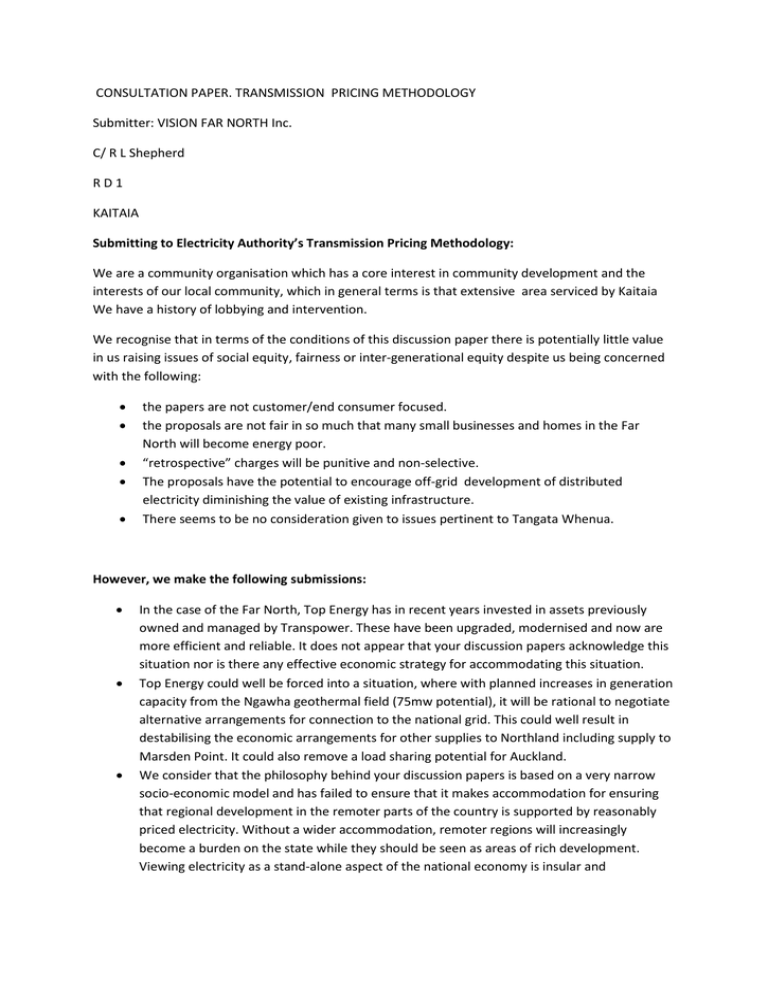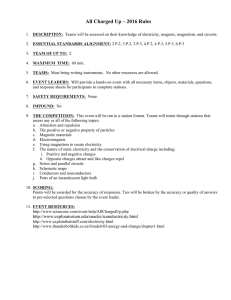Vision-Far-North - Electricity Authority
advertisement

CONSULTATION PAPER. TRANSMISSION PRICING METHODOLOGY Submitter: VISION FAR NORTH Inc. C/ R L Shepherd RD1 KAITAIA Submitting to Electricity Authority’s Transmission Pricing Methodology: We are a community organisation which has a core interest in community development and the interests of our local community, which in general terms is that extensive area serviced by Kaitaia We have a history of lobbying and intervention. We recognise that in terms of the conditions of this discussion paper there is potentially little value in us raising issues of social equity, fairness or inter-generational equity despite us being concerned with the following: • • • • • the papers are not customer/end consumer focused. the proposals are not fair in so much that many small businesses and homes in the Far North will become energy poor. “retrospective” charges will be punitive and non-selective. The proposals have the potential to encourage off-grid development of distributed electricity diminishing the value of existing infrastructure. There seems to be no consideration given to issues pertinent to Tangata Whenua. However, we make the following submissions: • • • In the case of the Far North, Top Energy has in recent years invested in assets previously owned and managed by Transpower. These have been upgraded, modernised and now are more efficient and reliable. It does not appear that your discussion papers acknowledge this situation nor is there any effective economic strategy for accommodating this situation. Top Energy could well be forced into a situation, where with planned increases in generation capacity from the Ngawha geothermal field (75mw potential), it will be rational to negotiate alternative arrangements for connection to the national grid. This could well result in destabilising the economic arrangements for other supplies to Northland including supply to Marsden Point. It could also remove a load sharing potential for Auckland. We consider that the philosophy behind your discussion papers is based on a very narrow socio-economic model and has failed to ensure that it makes accommodation for ensuring that regional development in the remoter parts of the country is supported by reasonably priced electricity. Without a wider accommodation, remoter regions will increasingly become a burden on the state while they should be seen as areas of rich development. Viewing electricity as a stand-alone aspect of the national economy is insular and • • • • unacceptable. It needs to be viewed as an integral part of the “big picture” which your proposals fail to do. Specifically, our interest is focused on the Kaitaia catchment. Here we have one of the two largest consumers of electricity in the Top Energy area, (Juken NZ.). This industry works on very small margins and a vacillating market. Any increases in electricity distribution charges as proposed by you will have the potential to make their operation uneconomic with a closure and devastating effects on the local economy. We also must point out that dairy farming in the area is highly dependent upon electricity with currently no capacity of farmers to absorb increases in electricity distribution charges. In our area, more than 10 % of the population is unemployed and more than 50% of the population have household incomes of less than $1100.00 per week. These households are unable to absorb the 10% increases proposed in you discussion document. While your proposal can potentially devastate our economy and possibly drive up unemployment and decrease the average e household incomes it would also potentially destabilise the national political balance of power. This will in turn result in less usage of existing lines assets hence diminishing their effective use and value. We submit that you must accept that you have responsibilities far beyond those purist economic models on which you have based your paper. We admit that we have struggled to fully interpret the models proposed by you. For us laypeople. We cannot follow your language or your reasoning. As you are aware, this government made a commitment to the use of “plain English” in all official documents but here you have failed to follow that mantra. We respectfully submit that your proposal patently favours large consumers and metropolitan areas at the expense of the poor, the isolated and the more remote areas of the country. In our eyes this is untenable. Overall, we do not see that any of your proposals will be acceptable to us. For more information please contact: rlshepherd@orcon.net.nz 09 4084192 R.L. Shepherd QSO FNZEAS ANZEI


